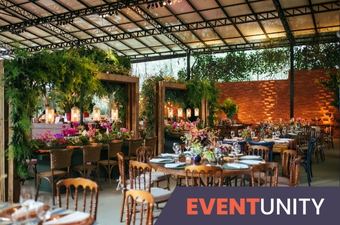Are you looking to start your own event venue business that promises big profit but is also full of fun and excitement? If so, an event venue business could be the perfect venture for you!
I’ve been working in the events industry for over 25 years. During that time, I’ve seen event venue businesses come and go. Still, the one thing that has always remained consistent is the passion of those involved in this sector. It is a great place to have your own business.
I’ve been responsible for venues with a million+ turnover catering to everything from small group meetings to 2,000+ capacity concerts.
From small family gatherings to major corporate events, I have had the pleasure of helping people create memorable experiences at every turn. Whether it is finding the right venue or developing unique event plans tailored to each client’s needs, I understand what it takes to ensure an event venue business runs smoothly and successfully.
This post will help you understand the key considerations for becoming a venue owner, including what to put in an event venue business plan.
What makes a great event venue?
I always think that putting yourself into the position of potential customers before starting an event venue is an excellent foundation for your business. In my experience, potential clients are likely to be looking for the following:
A great event venue has three key components: space availability, event planning services and a great overall atmosphere.
First and foremost, they will consider what kind of event venue is ideal for their event; remember, this is where you want to consider the type of event venue you want to run.
Do you want an indoor area or an outdoor one? Depending on your location, this could be a critical factor to decide on. Some places benefit from great weather all year round, so outdoor space is at a premium.
Research in 2012 showed the following as being the top ten attributes of a wedding venue that people looked for:
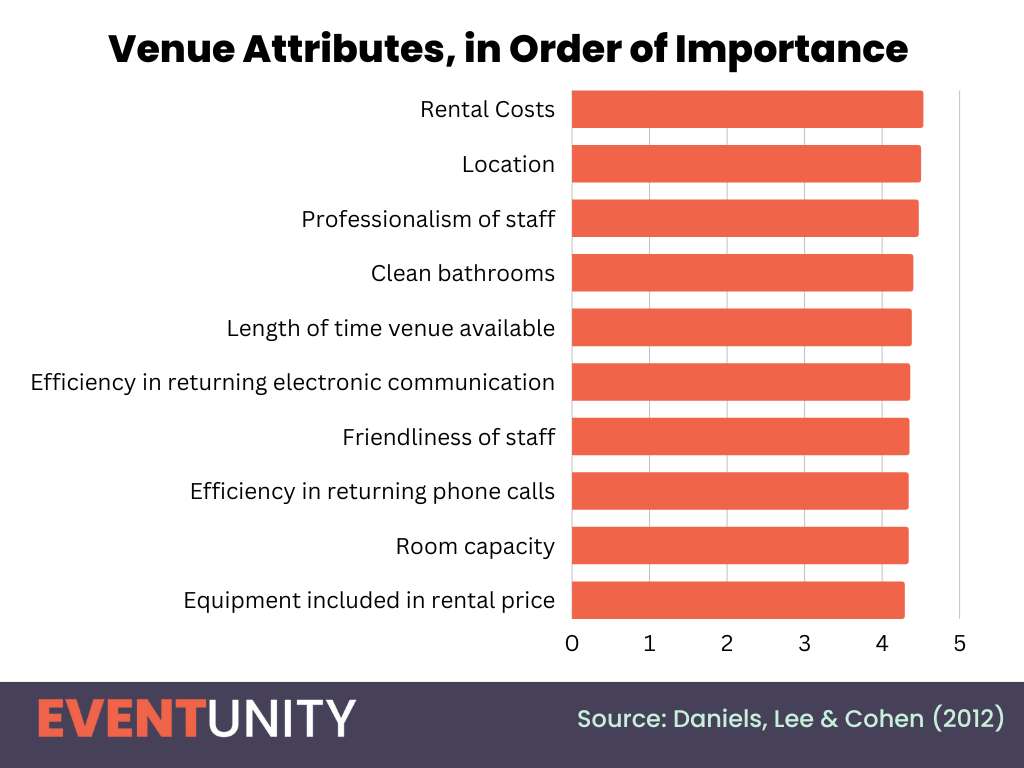
Weigh the pros and cons of starting an event venue.
With proper planning and preparation, event venue owners can quickly establish a successful business in their local area. If you want to start an event venue, It is essential to weigh the pros and cons before taking action. Let’s have a look at those:
Pros of starting an event venue
- Generate high profits from event hosting
- Create unique and memorable experiences for event attendees
- Flexibility to grow the business in size, location, and services offered.
- Expand to multiple venues in your local or regional
- Opportunity to collaborate with vendors in the events industry, such as caterers, florists, event planners etc.
- The ability to network with potential new customers through events you host
Cons of starting an event venue
- Capital intensive to start an event venue
- Finding the right event venue or space which fits your needs and budget can be time-consuming.
- You may face competition from other event venues in the area
- There is potential for large amounts of liability
- Event catering, entertainment, décor etc., can often require a significant amount of investment.
- An event venue business requires a lot of hard work and dedication to be successful in the long run.
Starting an event venue business can be a highly rewarding venture, both financially and emotionally. The events industry can be tough, and I can only speak from personal experience, but when it’s all working well and you stand back, it’s a pretty incredible feeling!
How to start an event venue business
Starting a new event venue business is becoming increasingly popular; there’s never been a better time to break into this growing industry.
But before we learn how to start an event venue business, we must consider why you want to do this.
Running event venues can be challenging but also a rewarding experience. It requires a special skill set to anticipate customer needs, manage event logistics and create memorable experiences.
Successful event venue businesses require long hours and dedication, successfully accommodating various tasks and roles at any time.
As a manager of an event venue, I’ve cleaned toilets, emptied tables and even had to mop up sick. I still loved every minute!
Before diving into the event venue business, you should first consider the type of space you want to run. Do you want an indoor area or an outdoor one?
From weddings to corporate events, event venues offer an opportunity to host unique experiences while making a profit. With the correct planning and preparation, event venue owners can quickly establish a successful business in their local area, so if you’re ready for an exciting journey into entrepreneurship.
In my experience of running event venues, it is all about the little details that make a single event for a client, but you can’t ignore the bigger picture of running an event venue business.
Identify the need for an event venue in your area.
Identifying the need to start an event venue in your area is essential to make it a successful business. By understanding what potential customers are looking for in terms of event services, amenities and locations, you can ensure enough demand to support your venture.
Knowing the local market will also help you determine which target events would be most profitable based on current trends and needs within your region.
Additionally, assessing the competition from existing businesses will allow you to carve out a unique niche or set yourself apart from other competitors by offering specialized services. With this knowledge, you can create a plan for success!
Conduct extensive market research.
Network with potential clients

Speak to event managers or event management companies in your local area and get feedback on their event venue needs. Ask what types of spaces they often use, what audience capacity they’re looking for, and if they have any challenges they face when looking for event venues. This can give you a good understanding of the needs in your local event venue industry, as well as any potential competition.
Make a list of potential competitors.
Find out what event spaces already exist in your local area and how they compare to what event planners are looking for. Knowing the local businesses can help you identify gaps in the market, allowing you to determine where your event venue business could fit in best.
Think about the types of events you could host
Consider the events you would like to support. Think about the event venue you could offer, such as outdoor, private spaces, and other unique event venue ideas. This will help you determine which event types are most suitable for your event venue business.
Use SWOT to analyze what you find.
My top tip here would be to use a tool like SWOT to analyze each of your competitors. Try to understand their weaknesses in terms of their audience, venue or location and consider how to make this an advantage for your event venue.
Identify the target market for your new event space.
In my experience, it is challenging for a single event venue to target all potential event clients. That’s why successful event businesses focus on a specific target audience that best suits their event venue capabilities. This is an essential part of starting an event venue business, but it is often overlooked in the planning stages.
NOTE: this might be one of your competitors’ weaknesses identified in the SWOT; you choose to serve an audience not currently catered for in the local area.
The target audience for event venues will vary based on the event location and event types offered. Generally, event venues should focus on specific target markets that best fit their space, such as corporate events, birthday celebrations, wedding receptions, or other special occasions.
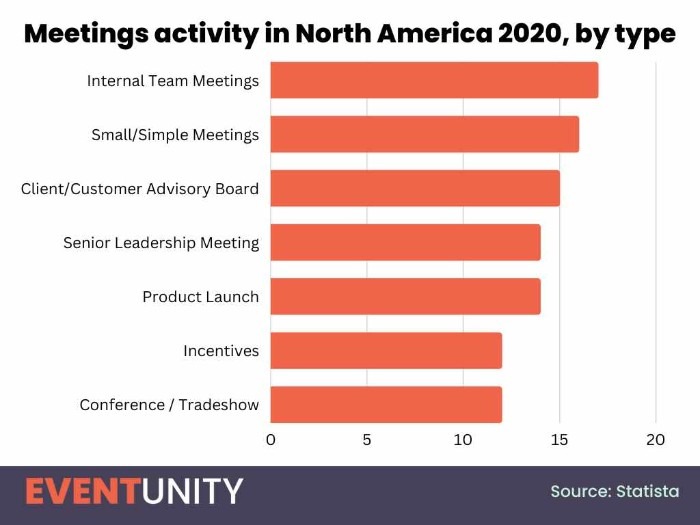
A while back, I wrote about the different types of events, but if you are short on time, here are some quick ideas for the types of events you might want to target:
- Wedding Receptions
- Corporate Events
- Private Events / Birthdays
- Graduations
- Business Meeting Space
- Networking Events
- Music Concerts
- Trade Shows & Exhibitions
- Sporting Events
- Fundraisers
Some of the most profitable events involve large groups of people and multiple event elements. Events such as weddings, corporate events, trade shows & exhibitions, and music concerts can generate more revenue than other event types because they often require more time and venue space.
The audience of any potential event can also make a big difference to profit, especially considering secondary spending.
Secondary spending refers to the additional money attendees spend on food, drinks, event merchandise, and entertainment. It is often overlooked or neglected when event organizers are planning their event budget, but it can make a significant difference to event profits.
Once you’ve identified the event types you are most suitable for, you can search for the right space to start an event venue.
Identify A Location For Your Event Venue

The best location for an event venue is easily accessible and offers event organizers plenty of options. For events such as weddings, corporate events, or large-scale gatherings, event venues should be near public transportation to make it easier for attendees to access the venue.
This was one of the key challenges I had with my very first venue. There was a minimal number of parking spaces adjacent to the venue, often putting off would-be hirers and attendees.
For any event venue intended for smaller gatherings, event organizers should look for spaces that provide an intimate and unique atmosphere.
Intimate event venues often offer more flexibility in terms of event layout and event design.
When looking for a venue, consider factors such as size, location, accessibility, and amenities.
Here are some ideas for searching for potential locations in your local area:
- Online real estate listing websites, such as LoopNet (US Link, UK Link), allows you to search for commercial spaces by location, size, and price range.
- Contacting a commercial real estate agent or broker who can help you find spaces that meet your specific needs and negotiate lease terms on your behalf.
- Using social media to network and connect with landlords, property managers, and other industry professionals who may know of upcoming vacancies.
- Checking local classifieds and newspapers for listings of commercial spaces for rent.
- Attend local business networking events.
- Searching for commercial spaces on online marketplaces such as Craigslist and Gumtree.
- Walk around and look for empty premises that could be potential event venues!
In the United States, you need to be aware of zoning, which defines the types of businesses that can operate in a particular area. Check with your local city planning office.
In the UK, you need to know that different premises have different use classes. There is an excellent guide to planning classes by the Planning Geek.
Create Your Event Venue Business Plan
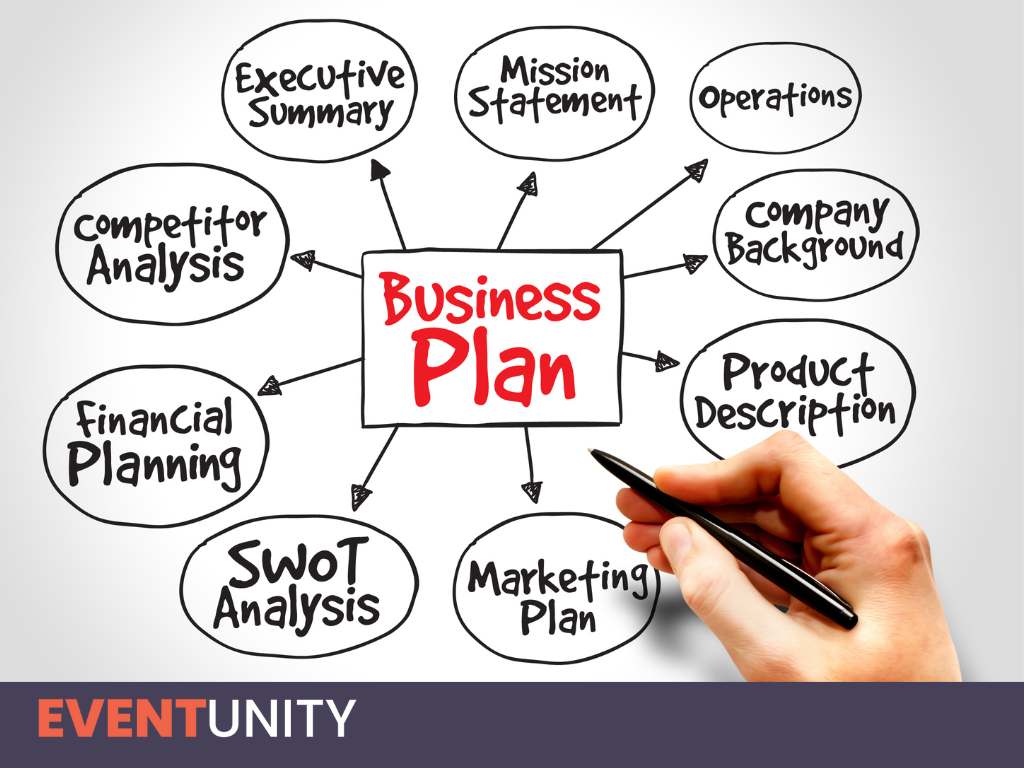
A venue owner must have a business plan that outlines the goals, strategies, and resources of an event venue business. It serves as a roadmap to guide event organizers in making sound decisions and helps them stay focused on their event objectives.
A detailed event venue business plan is critical for success when starting a venue business. A business plan should not only include the venue’s mission, goals and objectives but also outline the target markets, event fees, marketing plans, event logistics and event budgets.
When creating a business plan for an event venue, event organizers should consider factors such as market research and industry trends to help them identify the event types and event services that will generate the most revenue.
In addition to this, event organizers should also consider event pricing and event fees, budgeting for event staff & event supplies, and developing marketing plans to reach event attendees.
By creating a comprehensive business plan, owners can make sure their event venue is well-prepared for event bookings and event attendees.
If you want to learn how to create an effective venue business plan, then Skillshare has just what you need! Their online courses provide event organizers with the knowledge they need to craft event plans that will help them reach their goals and maximize their potential. With our easy-to-follow lessons, event organizers will have all the resources they need to create detailed plans that include market research, industry trends, event pricing & fees, budgeting for staff & supplies, marketing plans and more!
Sign up today and get started on your journey towards success as an event planner! The link below gives you one month of free access to all of their courses.
But let’s look at some of the specific areas you should include in your venue business plan.
Develop Your Event Venue Business Model
The event venue business model is a vital strategy event organizers should consider when starting an event venue business. Developing a sound business model can help owners better anticipate potential costs and profits, as well as identify the event types and event services that can generate the most revenue.
Event Venue Business Pricing
When venue owners are creating their business model, they should consider factors such as event fees, event staff/supplies, event space layout/design, marketing strategies and customer service practices.
The top three pricing strategies for event venues are hourly, package, and event-based:
- Hourly event venue pricing is a popular approach for event organizers due to its flexibility and simplicity. An event venue typically charges an hourly rate for the use of their space, which event organizers must pay regardless of the event type or the number of guests.
- Package event venue pricing strategy is ideal for event organizers who are looking to book their event space for multiple uses throughout a period of time. An event venue charges a flat fee for the use of the event space for an extended period, which provides event organizers with a discounted rate and more predictable costs.
- Event-based event venue pricing is a great option for event organizers who need to book event space for specific event types. An event venue typically charges an event-based rate for the use of their event space, which takes into account the amount of time needed, the number of guests and other event services that may be required.
Event Venue Business Catering
It would help if you considered where to offer catering services for the venue; there are several factors to consider. It is essential to determine if your event venue has the necessary kitchen facilities and equipment to prepare and serve food.
If not, you may have to invest in the right supplies and tools needed for a successful event catering service.
Business plans are essential for an event venue business that need to raise finance. An entire business plan is a must-have when seeking investments, as investors will want to know all the details of your event venue and services.
Event Venue Business Promotion

Marketing event venues can be a daunting task, but it doesn’t have to be. Sadly it is not just about setting up social media accounts; it takes a bit more than that.
With the right strategies in place and some creativity, event organizers can create an event venue that is both inviting and functional for their guests.
With the right plan of action in place, event organizers can ensure their event venue stands out from the competition and attracts potential customers.
In my experience, there is no silver bullet to doing this, as a wide range of factors such as location, target audience, and marketing costs impact what you can do.
MY KEY TIP: Understand who your target audience is and which marketing channels work best to reach out to them!
Here are some ideas to consider
- Create a website with photos, videos, and information about the event space to showcase its features and capabilities.
- Utilize social media platforms to reach a broad audience and promote the event space. You may want to consider advertising on things like Facebook to get the best traction.
- Partner with local event planners and vendors to promote the event space to their clients.
- Reach out to local media outlets to generate press coverage for the event space.
- Offer special deals or promotions for first-time bookers.
- Host open houses or tours of the event space to give potential clients a firsthand look.
- Create a referral program to incentivize current clients to refer friends and family.
- Use targeted online advertising to reach potential clients in your area.
- Network with other event venues to cross-promote each other’s spaces.
- Make sure the event space is easily searchable on Google and other search engines by optimizing the website and listing it on online directories.
How to register your Event Venue Company
I must stress that you have a responsibility to check the requirements for this in your local jurisdiction. If in doubt, consult local legal or financial professionals who would be able to advise you best.
As a venue owner, you will be responsible for all of the small business administration, including business expenses, operating expenses, startup costs and cash flow.
That said, a broad overview of business options in the United States and the United Kingdom looks like this.
United States
When registering a company in the United States, event organizers should be aware of several key steps involved. To register a business in the US, owners must decide what type of business entity they want to form and then follow the necessary procedures for registration.
The different types of business entities in the United States include sole proprietorship, partnership, limited liability company (LLC), corporation, and non-profit organization. Each type of business entity has unique advantages and disadvantages that event organizers should consider before deciding which one is best for their business.
For more information, check out the US. Small Business Administration website here.
United Kingdom
In the United Kingdom, event organizers have several business entity options to choose from when registering a company. These include sole traders, partnerships, limited companies, charities, and Community Interest Companies (CICs).
Sole traders are legal entities that are owned and managed by one individual. This type of business entity is attractive to event organizers because it requires little paperwork and is relatively easy to set up. There is personal liability associated with this route which means you are personally responsible for any debts of the business.
Partnerships involve two or more people who share ownership of a business. At the same time, limited companies are owned by shareholders. They have limited liability, meaning that any losses incurred by the business cannot be attributed to the shareholders’ personal assets.
A Limited Liability Company (LLC) is an attractive option for event organizers in the UK as it offers several benefits. Firstly, an LLC offers limited liability, meaning that the event organizer’s personal assets are protected from any losses incurred by the business.
For more information, check the UK Government business advice website here.
In all cases, you must register your event venue business with the appropriate tax authority to pay the required taxes on any profits you make. This is the IRS in the United States and HMRC in the United Kingdom.
Get the Required Business Licenses and Permits
As with the previous section, you should consult with local legal professionals to fully understand the proper licenses and permits you will need to operate your business.
In most countries, you will need a license or permits to operate an event venue, including serving alcohol (liquor license) and live musical performances.
Designing and setting up the space
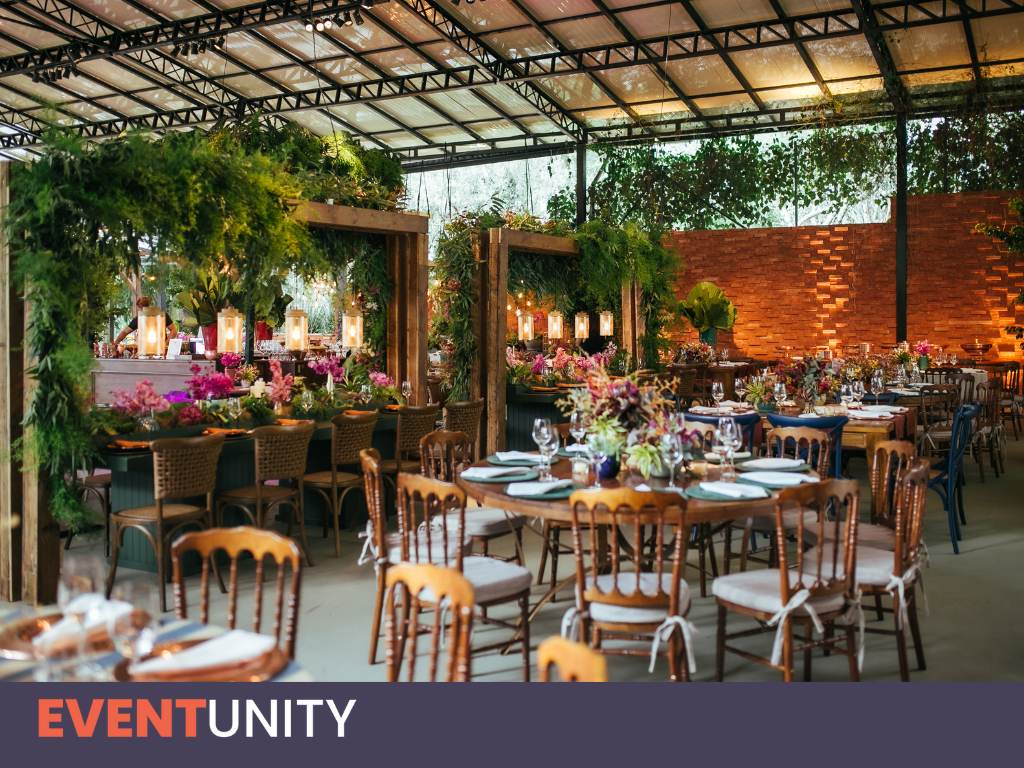
Event venues should be multifunctional because they offer organizers who book events a unique opportunity to create an atmosphere and experience that attendees will never forget.
What hirers will look for
With the right design and layout, hirers of your venue can customize the space to accommodate any event- corporate meetings, team building activities, private social events, trade shows, conferences, and many more.
When designing an event space, you should consider the likely event goals, event attendees, event technology requirements, and event budget of potential hirers.
Clients will want to make sure that the event space layout allows for adequate walking space, seating capacity for all guests, access to power outlets for event AV equipment such as projectors or microphones, and event lighting that is appropriate for the event.
Finally, event planners will also consider the event furniture they want to include in their event space, such as tables, chairs, and couches.
Event furniture can be rented or purchased to fit any event style. It will depend on your initial startup budget as to whether you buy these outright or hire them in the initial period of operation.
Optimize the layout for your business model
Optimizing the event venue layout is key to creating a successful business model. Being flexible allows incoming event planners to use the space as their see fit.
In my experience, when you are doing client visits to the space, affording them the maximum flexibility to create their event means you are much more likely to win the event.
A word of caution here, no event venue can be all things to all clients or customers. It is worth designing the space to suit a handful of event types, hopefully, the ones you identified in your market research.
Consider the flow of people in the event space.
A key consideration should be maximizing guest flow and comfort, as this will have a significant impact on event success.
Unless the type of event calls for it, don’t just pack an event space with tables. You need to think about how much space people have to move around.
An exception here would be any kind of music event venue, like a concert, where you actually want a decent amount of people to create a great atmosphere.
To ensure smooth movement, you should consider factors such as allowing room for guests to mingle and providing adequate seating arrangements.
It’s also important to consider the venue and how best to use it. Event organizers will pay special attention to lighting, furniture, and decorations.
Consider the technical equipment needed.

The technical equipment requirements for your potential venue space will vary wildly, and so will the costs!
You might only need a few socket outlets for a yoga class, right through to significant power requirements for large concerts.
You will need to decide whether or not you should rent additional equipment, such as audio-visual equipment (e.g. projectors), sound systems, dance floors and stage lighting.
In some cases, hirers may also consider hiring event production professionals who can support planning and organization.
Finally, any venue rental business needs to plan for event security, which might include hiring event security personnel or event organizers need to ensure that the event venue has proper safety measures in place. This may also include security systems like CCTV.
Ultimately, event organizers will want to create an event venue space that is both inviting and functional.
Managing And Running An Event Venue Business
Hire great staff.
Hiring great staff for event venue businesses is essential for successful event planning, organization, and execution. To ensure you hire the best possible event staff, event venue businesses should take a thoughtful and comprehensive approach to recruitment.
The first step to hiring great event staff for event venue businesses is creating a detailed job description outlining the qualifications and responsibilities necessary for the position.
The job description should include skills such as planning, organization, communication, and customer service experience. It should also list specific requirements such as knowledge of event technology, availability outside of normal office hours when needed, or special certifications or licenses.
Get Business Insurance for Your Event Venue Business
Insuring an event venue business is an essential part of running a successful event. Event organizers should consider getting event insurance to protect themselves and their guests from potential losses.
Insurance policies for event venues are designed to protect event organizers and event attendees from potential losses. Event venue insurance offers liability and event cancellation coverage, providing event organizers with the peace of mind that their event will be protected. Liability coverage protects event planners in case event attendees suffer bodily injury or property damage while at the event and event cancellation.
Developing policies and procedures for booking and hosting events
It would be best if you had robust policies in place to deal with things when they go wrong. This could include policies on cancellation, entry, food hygiene or the admittance of children.
Event Venue Business FAQs
Do I need a business loan?
If the event venue is already established and equipped, then a business loan may not be necessary.
What is a venue checklist?
A venue checklist is an important tool for event planners, as it helps to ensure that all necessary steps have been taken and all details have been accounted for when opening a venu
Do I need a business bank account?
It is essential to open a dedicated business bank account when starting an event space business. This will help you keep track of your income and expenses and manage your finances more effectively.

